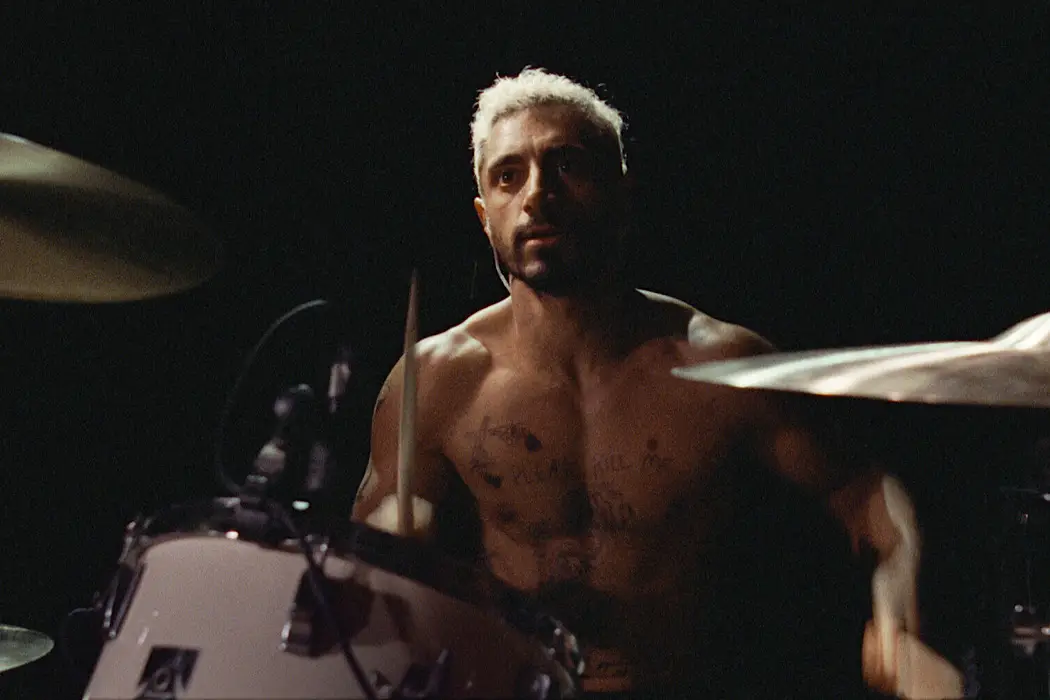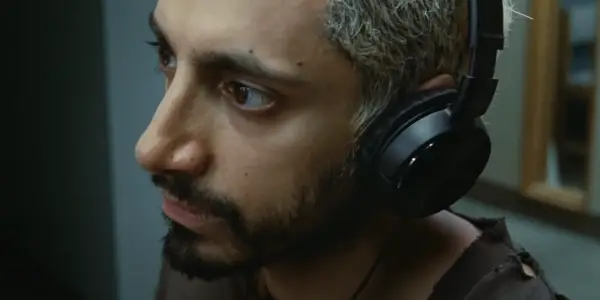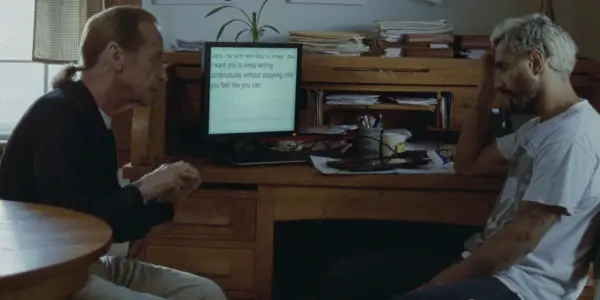SOUND OF METAL: An Innovative, Meditative Experience

Kevin L. Lee is an Asian-American critic, producer, screenwriter and…
PBoy, this film lives up to the word “sound” in its title.
Writer/director Darius Marder has crafted an incredible, bold, and respectful feature debut. With the simple premise of a heavy-metal drummer slowly losing his hearing, Sound of Metal starts at a ridiculous high, and both Marder and lead actor Riz Ahmed are pressured to keep the momentum going. Fortunately, not only do they succeed, but they also slow the film down at the right times for a meditative, rewarding experience.
And the Oscar for Best Sound goes to…
I have to address the elephant in the room – the sound design in this film is f*cking incredible.
We’ve seen films that manipulate audio before to simulate what characters hear, but generally they never go past that ringing sound when a bomb goes off nearby. Sound of Metal immerses you into Ruben’s (Ahmed) experience non-stop. We hear bass, vibrations, distortions, everything. Watching this film with my Beyerdynamic headphones was probably the best decision I’ve made. I needed a moment to re-adjust when it was over; it truly felt like I was also losing my hearing.

But perhaps the most important part of the sound design comes from how the film uses silence, and how our feelings for silence change over time. In the first act, silence is painted with a terrifying context. It’s like a nightmare, like your body betraying you. It’s a very real state of panic that we empathize with in Ruben, and we understand his need to retrieve that hearing loss, almost like it’s an addiction.
But once Ruben is brought into and taken care of by the deaf community, the film makes some bold decisions here on out.
Then the Film Slows Down, And You Should Breathe It All In
After the first twenty minutes of the film, Sound of Metal shows its true compassionate colors to the deaf community.
Marder once talked about how deaf people communicate with each other, and how it is much more engaging and thoughtful than people who can hear. When you communicate through ASL, you listen with your eyes. You can’t be affected by anything else. You can’t listen to somebody while looking at your computer screen or your phone like a hearing person normally would. During Stephen Saito’s interview with Marder on Moveable Fest, Marder identified a “sickness in hearing culture, which is the sickness of distraction.”
Sound of Metal is Marder reaching out to the audience. He is asking us to be present in the moment, with Ruben, and with the deaf community that is more than happy to help him. He is asking us to understand deaf culture, to make a bridge between two communities that don’t often see eye to eye. Even something as tiny as hardcoding subtitles into the film for deaf audiences speaks volumes.
The film dramatically slows down its pacing here in the second act, which may come off as a surprise, since the first act careened with Whiplash-like urgency. But as the film progresses, you’ll realize this meditative portion where Ruben slowly comes to accept his new situation and to be at peace with it, is the real story Marder wanted to tell. I commend him for his priorities.
Wonderful Performances
Everything incredible you’ve heard about Riz Ahmed is true. Ruben essentially goes through the five stages of grief in Sound of Metal. Quite literally, the final acceptance stage is his character arc. It may be a familiar and predictable path, but Ahmed sure makes the journey intense and memorable.
Much of his Oscar-worthy performance comes from being able to play off of amazing supporting actors in the cast. Olivia Cooke makes a brief but significant appearance in the film as Lou, the lead singer of the band and Ruben’s girlfriend. They’ve been through their own rough patches in life, and as we learn more about them, we understand how they’ve helped each other find their footing. Despite the small amount of screen time, Cooke helps Ahmed create a sense of history in Ruben through his relationship with Lou, while offering just enough for us to wonder what goes on in Lou’s head.

But there’s a special performance here from Paul Raci as Joe, the leader of the small deaf community that takes in Ruben. There’s a rocky but somewhat steady relationship between Joe and Ruben, and you can vividly see the figurative hands reaching out but failing to touch since the two speak at different wavelengths. They come from different worlds. They have different outlooks, different attitudes, different phases in life. But the one thing they have in common is they both lost their hearing.
Sound of Metal: Intense Yet Tender, Heated Yet Sensitive
Sound of Metal is an innovative piece of work; it starts off intense and visceral until it takes a turn and becomes a tender, compassionate exploration of acceptance.
It’s a fantastic debut by Marder, who managed to create some of the most immersive film audio I’ve heard in recent memory. Sound of Metal will join Todd Haynes’ Wonderstruck is one of the most respectful films I’ve seen to the deaf community.
There is an undeniable intimacy, even a vulnerability. To communicate with your hands, your face, your eyes. I think you have to truly know yourself and accept yourself to express that openly, and that makes for a moving story for Ruben having to overcome his self-inflicted pain and anger. This is one of the best films I’ve seen so far this year; an absolute must-see.
Did you see Sound of Metal? What did you think of the film? Share below!
Amazon Studios will release Sound of Metal in theaters on November 20th, 2020, and on Prime Video on December 4th, 2020.
Watch Sound of Metal
Does content like this matter to you?
Become a Member and support film journalism. Unlock access to all of Film Inquiry`s great articles. Join a community of like-minded readers who are passionate about cinema - get access to our private members Network, give back to independent filmmakers, and more.
Kevin L. Lee is an Asian-American critic, producer, screenwriter and director based in New York City. A champion of the creative process, Kevin has consulted, written, and produced several short films from development to principal photography to festival premiere. He has over 10 years of marketing and writing experience in film criticism and journalism, ranging from blockbusters to foreign indie films, and has developed a reputation of being “an omnivore of cinema.” He recently finished his MFA in film producing at Columbia University and is currently working in film and TV development for production companies.













